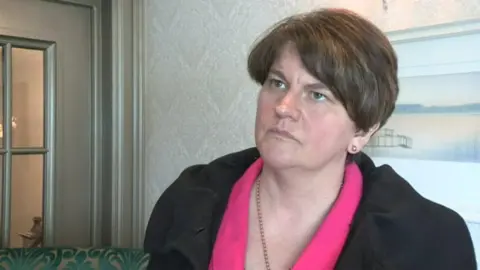Arlene Foster appeals for legislation on emotional abuse
 Getty Images
Getty ImagesDUP leader Arlene Foster has appealed to the Home Office to bring forward legislation to tackle psychological and emotional abuse.
She was speaking at a conference in Fermanagh on coercive control.
The PSNI said it needs new laws against coercive control with record levels of domestic violence.
Legislation is in place in England and Wales, but similar legislation planned for Northern Ireland is held up by the lack of a functioning assembly.
The conference was organised by Fermanagh Women's Aid in Enniskillen.
It will hear from people who have experienced abuse from a controlling family member, including Luke and Ryan Hart.
Mrs Foster said: "This piece of legislation is critically important because coercive control goes on right across society in Northern Ireland."
"It's something that isn't spoken about and that's why this conference is so important today to highlight it.

"Hopefully, if there's someone out there suffering coercive control, that they will come forward and allow it to be dealt with.
"The legislation of course is there, it's ready.
"We heard from the former justice minister (Claire Sugden) today that the legislation is ready.
"So I would appeal to the Home Office, and indeed the secretary of state, to push ahead with this so that Northern Ireland is not left behind because we don't have an assembly or an executive."
'Prevent harm'
A senior PSNI officer has said legislation to tackle psychological and emotional abuse is needed to help police deal with increasing levels of domestic violence.
Supt Clive Beatty said it would make it easier for police to help victims.
"To detect offences we need legislation, it makes it easier for us," he said.
"It's when we don't have the legislation that we then have to provide other support for the victims.
"Some victims do require the criminal justice route and when we have the legislation to help us with that, that's where we will take them.
"But often it's just about the knowledge and understanding in the officer's mind about how they can help this person through all means, so that ultimately we protect people, we prevent harm and we detect offences."
Officers have been given extra training to improve the help they provide to women suffering domestic violence.
Between 1 October 2017 and 30 September 2018, there were 31,008 domestic abuse incidents recorded - the highest since records began in 2004/05.
In Fermanagh and Omagh, the police receive a domestic violence-related call on average once every three hours; across Northern Ireland it is once every 17 minutes.
A review into the killings detailed how Mrs Hart and her three children had been suffering from coercive control abuse for many years without realising.
Michelle Alonso, the training co-ordinator at Fermanagh Women's Aid, said the story would help "shatter the silence" of domestic violence.
"They also felt that this was not abuse because there was no physical violence there, but unfortunately the physical violence came at the end and there was no coming back from that," she said.
"They feel, as we do, that the message needs to come out, the prevalence of the subtle nature, the manipulation and the mind games, the control that is there and which is not evident immediately to the visible eye and today will give that deep understanding.
"We would say domestic violence thrives on secrecy so today the secrecy ends.
"Today coercive control will get a stage and will get the publicity that it needs."